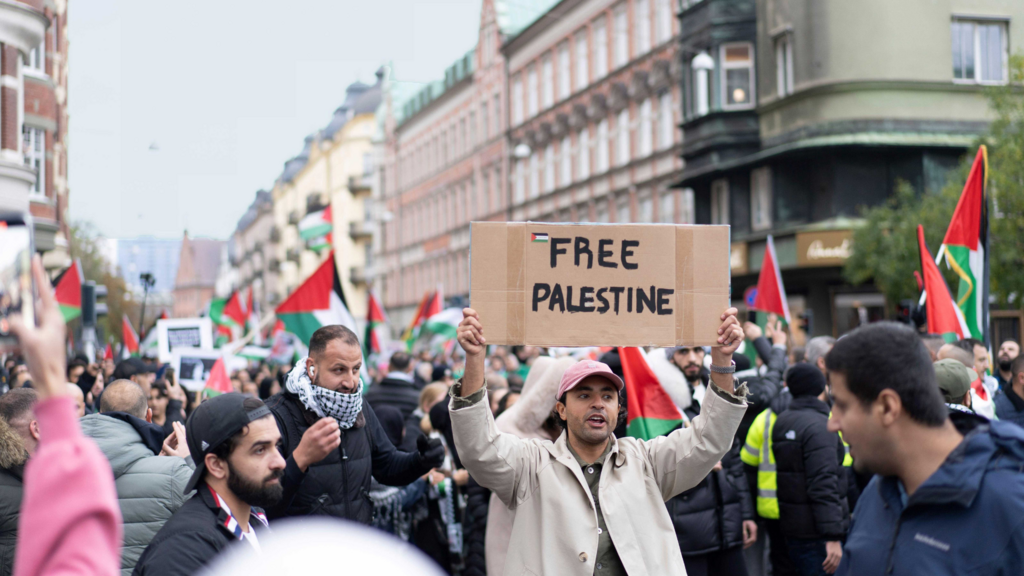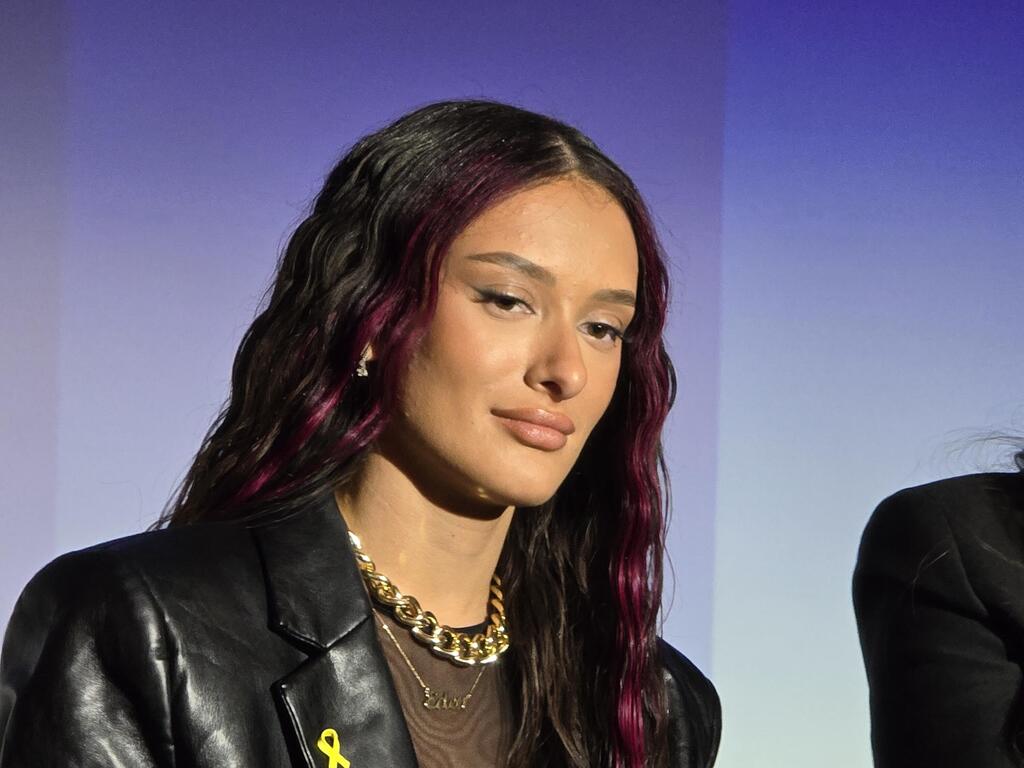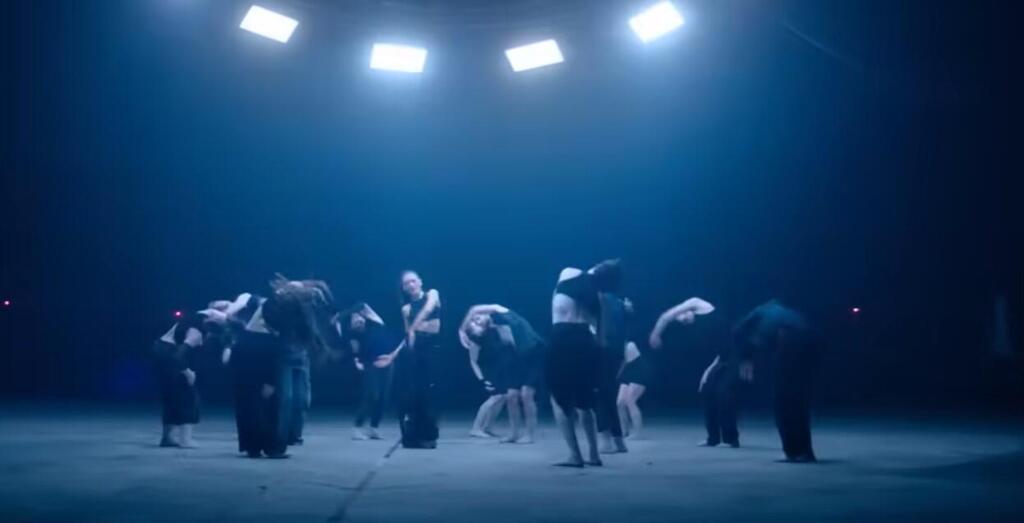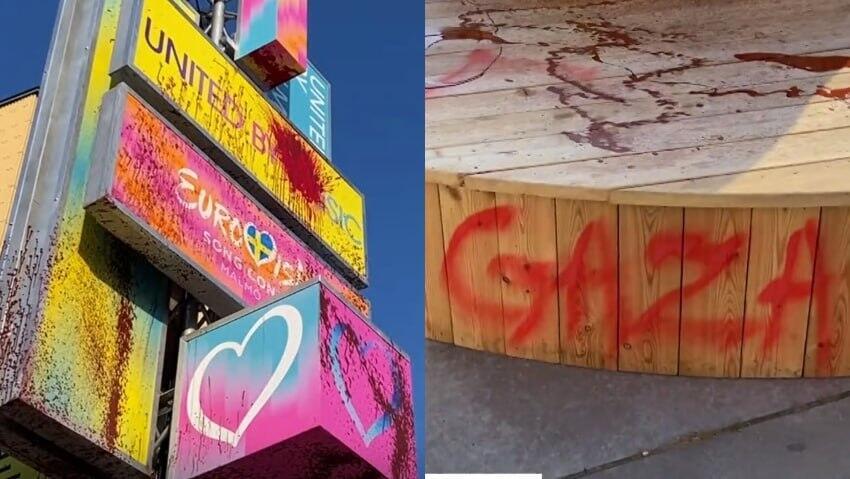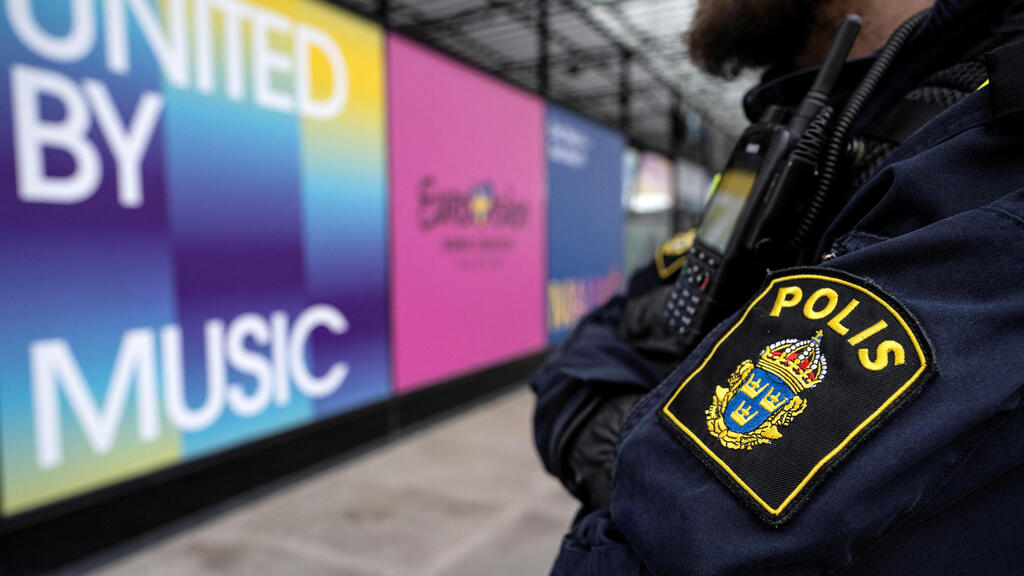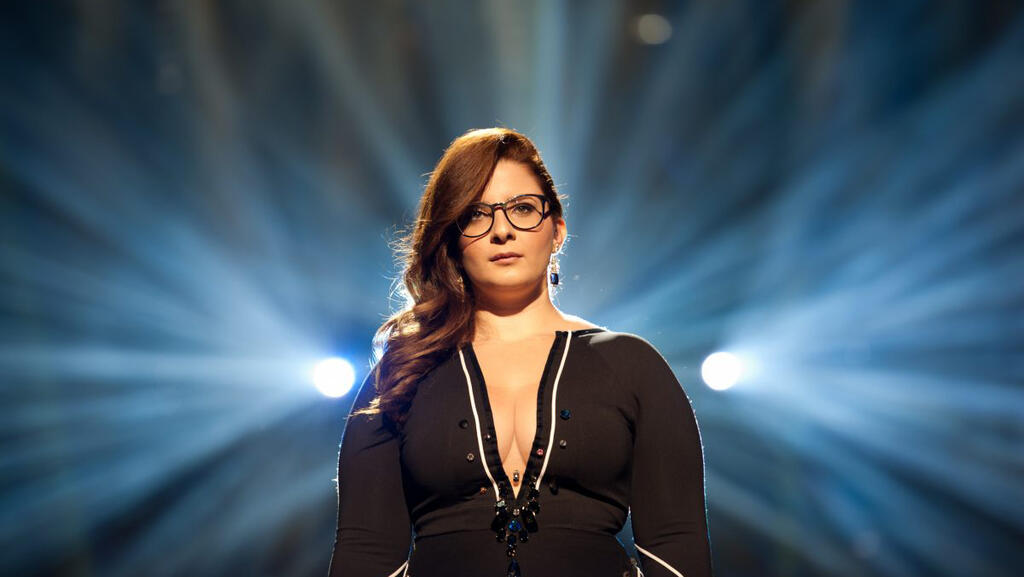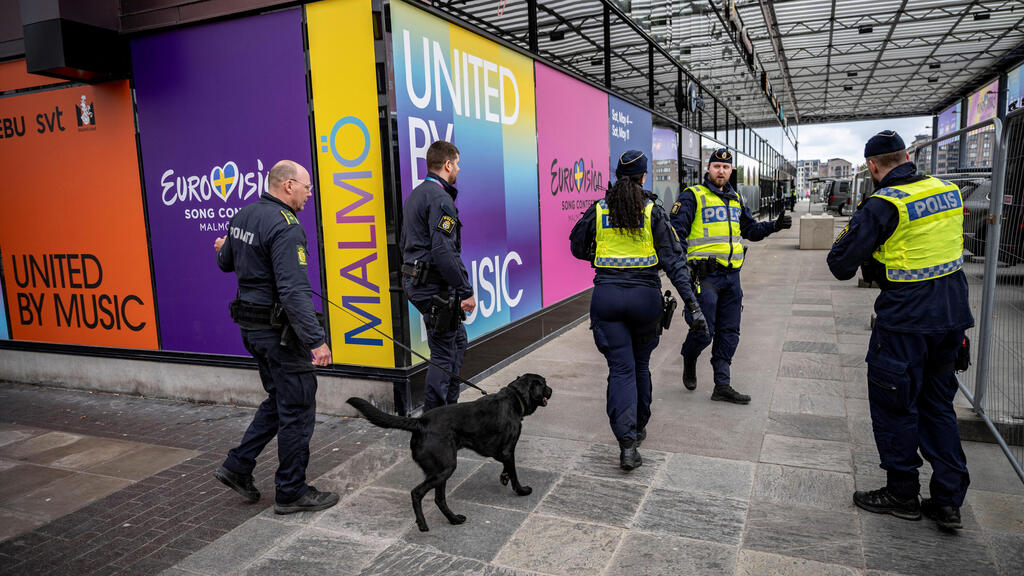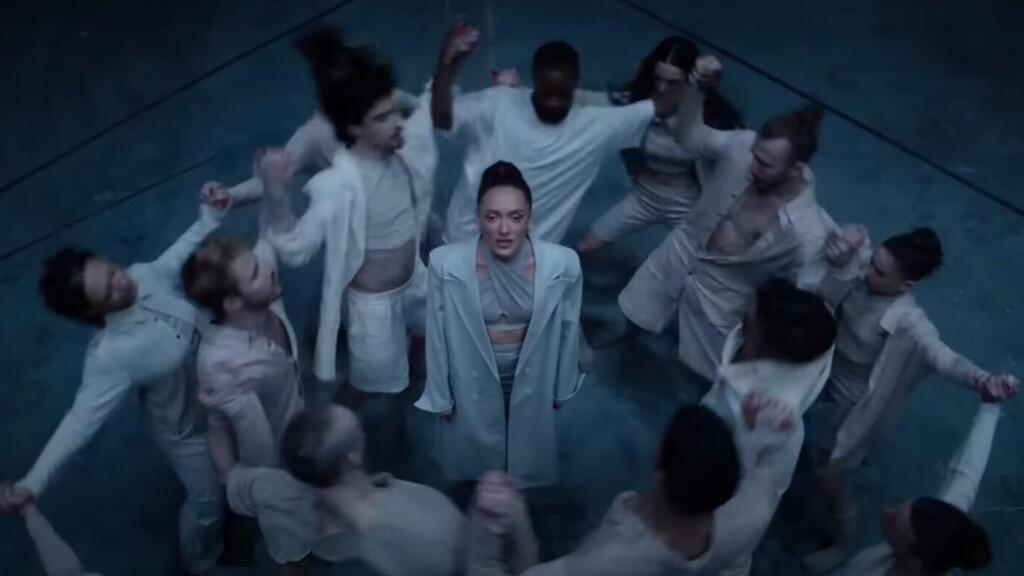Getting your Trinity Audio player ready...
Poor Sweden. All it wanted was to host the Eurovision Song Contest again, for the seventh time - and for the third time in the city of Malmö. One hundred thousand visitors, a nonstop international party, flags, cultures, some oxygen and sparkles to the grayish and rather sleepy city.
There was even talk of Abba comeback for the 50th anniversary of "Waterloo" and the country's first win in the competition. The Swedes prepared for a week of kitsch, bizarre shows, rather terrible music, and enough alcohol to cloud it all. But then October 7 occurred.
"On Saturday, even before I knew what had happened," recalls Irit Erlinski (40), a former Israeli, mother of three and kindergarten teacher in Malmö, "there was already a convoy of cars beeping, and I said to myself that it was strange hearing wedding sirens so early in the morning." It took a while for her to realize that they were celebrating the massacre that took place in Israel.
This carnival lasted all day long, with convoys of vehicles beeping ecstatically, featuring Hamas and Palestine flags and even children dressed as Hamas terrorists. Erlinski immediately felt the change, and in the most sensitive place of all: her children's school. "I went to the administrators, asking them to protect my son from the bullying he was experiencing at school, physically and verbally," she says. "I was very adamant. Two days later, people from welfare came to see why I was so nervous."
Thousands of Muslims living in Malmö participated in these violent celebrations and in anti-Israel demonstrations that have been taking place in Malmö since then. And suddenly, everyone forgot about Abba's comeback, and the Middle East reality was thrown directly into an event which entire essence is escapism. "The song contest has become a reality," states Nols Noling, the Malmö police communications officer, where they realized that holding a Eurovision contest in the most Muslim city in Sweden after October 7, is quite a headache. "Our intelligence works non-stop, and especially in social networks."
And what do you anticipate?
"We know for sure that there will be huge demonstrations here. We expect anti-Israel demonstrations with the participation of Muslims, leftists, BDS activists and anarchists who will come from all over Europe. In addition, we are afraid that Putin's people will arrive and try to undermine the image of Sweden, which recently joined NATO, and we are also preparing for extreme right's attempts to burn the Quran and make provocations. We are not preparing for a music competition, but rather for a battlefield."
So how do you prepare for such a battlefield?
"We are prepared for any scenario, be it a shooting or a bomb or kidnappings. We have the tools and the personnel to handle it. There will be thousands of police officers from all over the country to help with security. But if the intelligence and the federal police discover that there is a concrete threat - one or more people with means, intention and purpose - then we will set the highest threat level 5 which has never been applied here before."
And what happens then?
"And then almost everything will be canceled."
"Usually, going to the Eurovision Song Contest is a trip that people fight over," a member of the Israeli delegation, who asked to remain anonymous, told me. "This time everyone is trying to avoid it. They don't want to go to Malmö because it is a Muslim and an unpleasant city. Everyone knows that it will be a travel which involves only hotel-concert hall, concerts-hotel trips, without any free time, without a traditional Israeli party, which is the most popular party at the Eurovision every year, and it feels like a bummer; and not just for us."
For whom else?
"Also for Eden Golan, the Israeli representative in the competition, who has worked her entire life to reach this moment. And now, instead of singing a song and competing, she is thrown into an advocacy battlefield."
Shop windows
Malmö is the third largest city in Sweden, with a municipal population of about 340 thousand inhabitants in the city and about double that, if you include its metropolitan areas. It is considered the "most Muslim city" in Sweden: the conservative estimates are of about 50,000 Muslims in the city - in practice there are probably more - and some of its streets, especially the immigrant district Rosengård, look like an Arab city in the Middle East. There are even those who call Malmö "Ramallalmo."
All these have made Malmö one of the fiercest centers of resistance against Israel in Europe in general and in Sweden in particular. But now, the explosive combination of the war in Gaza with the Eurovision, in which Israel is supposed to participate, is well featured in the city streets.
About a month ago, the large Eurovision sign was vandalized outside the "Malmö Live" concert hall, where it is supposed to take place, using red paint and supposedly signs of blood, with the inscriptions "Free Gaza".
The violent demonstrations that occur here every Saturday were coupled by Pro-Palestinian demonstrations, which also have a fixed day and location: Mondays at the square in front of the City Hall, a reddish and impressive building from the 16th century. They are demonstrating against Israel and the war in general and are calling specifically for the removal of Israel from the Eurovision Song Contest.
The demonstrators, so it seems from the demonstration I attended, are mainly second-generation immigrants from the Middle East and young Swedish leftists belonging to the local Woke movement, who somehow seem to be incredibly white and mostly blond.
"We want the municipality to boycott the competition, to cancel it, to move it to another city or country," one of the demonstrators tells me. Around her neck is the inevitable status symbol, a black keffiyeh. "I think it's a shame that a cultural event includes a country that is currently committing genocide."
Behind her, on the benches located in the boulevard which are painted in LGBT colors, someone spilled red paint, similar to the paint spilled on the Eurovision sign. This, somehow, is being overlooked by that demonstrator.
On the way, on the main pedestrian street in Malmö, on the display window of a popular hipster clothing store called "Bjork & Secondhand", it reads in white "Stop the Genocide." In the display, next to the mannequins, there is a monitor that simulates a Eurovision contest scoreboard, but instead of countries, it reads all the "crimes", that, according to their opinion, Israel commits in Gaza.
Inside the store there are additional signs with flags of Palestine, and behind the cashiers there are more digital monitors with similar inscriptions. "I think it's not cool to do something like this to a country and its representatives who will come and stay here," says a barista working at the adjacent "Espresso House". "But I can tell you clearly that since they started the campaign, their stores are full, much more than usual."
"We want to stop the genocide," Theresa from the company's headquarters wrote to me, "and we use the shop window to provide information about the genocide conducted in Gaza. We criticize the Israeli government and its military operations. We don't understand what the connection is between trying to prevent genocide and the anxiety among Jews in Malmö. There are many people who are against this genocide."
Is it possible that you will conduct a similar campaign against Iran and Palestine and their policies toward women and LGBT people, values that I am sure are important to you?
"Homophobia and sexism are universal problems, we of course oppose them, but we also oppose genocide and ethnic cleansing."
Journalist Sofia Narbrand (50), a political editor of the popular Swedish daily "Svenska Dagbladet", could have easily been one of the demonstrators in the City Hall square or a loyal client of the "Bjork & Second hand" chain, plus wearing a keffiyeh on her neck. But she is not. For over a decade she has participated in pro-Jewish demonstrations and acts in favor of the city's shrinking Jewish community.
She recognized the internal contradictions of her left-wing colleagues a long time ago. "We are supposedly guilty for everything," she says. "Everything related to the West is bad, and Jews are the West. So, the Palestinians are the victims, here (in Malmö) and there (in Gaza). And they are allowed to do whatever they like, and they can be forgiven for their attitude toward women, LGBT people, human rights, their honor culture. It's crazy self-hatred."
You also held these opinions.
"I like to be naive. We wanted to help them because we didn't help the Jews in World War II, but all the trust we had was cracked. There are now discussions here about having separate days and hours for women and men in public pools. All the procedures taking place in the Ministry of Welfare and Immigration are done without a single word in Swedish.
"Single mothers earn less money than immigrants who decided not to work. There are teachers here who are afraid to report on child abuse because they fear the parents' reaction. That's insanity. We thought we would pull them to the Swedish-secular culture, but the opposite is happening.
"We wouldn't be generous again today. We have no brakes or balances anymore. We were exploited, and this cannot continue anymore. All our values have been turned upside down. If someone is a guest at my house, he cannot tell me what to do.
"And he should understand that antisemitism is not acceptable in Swedish society, let alone antisemitism as a result of what is happening in Israel. What's that got to do with it? Is this a legacy I want to leave to my children? This is the last existential battle for our identity and culture, and I think it is best to start it with a pro-Israel demonstration, but I am afraid where I shouldn't be afraid. I have to surpass this barrier."
You are in Sweden, which is one of the most liberal and free countries in the world, and you are afraid to demonstrate in favor of Israel?
"I want to go and show support for Israel during the Eurovision Song Contest, but the fear is already in me, and it upsets me, really upsets me, because I am a Swedish citizen just like them, and I am afraid to exercise the most basic right I have, to demonstrate.
"I go to pro-Israel demonstrations with sneakers a small bag in case I will have to escape. And what about them? They are not afraid to get together in their thousands screaming "from the river to the sea". They don't see themselves as Swedes. They don't care about us. It saddens me. We gave them everything, and we didn't ask them to be blondes, only to respect the basic laws of the country that welcomed them, rescued them from the wars, gave them everything from day one. It's not much to ask."
The spotlight of the world
This entirely explosive situation is rolling quickly to the days between May 7 and 11, when Malmö is supposed to host the two Eurovision semi-finals and the competition itself. The European Broadcasting Union (EBU), which operates the Eurovision, the municipality of Malmö and the Swedish police are racking their brains for a way to make it all pass safely this year.
"Normally, two months before the competition, we already have the entire itinerary, including security arrangements," says a member of the Israeli delegation. "But this time, everyone is telling us that due to security matters, no information will be provided to us until the last minute."
Madeleine Sinding-Larsen, the competition's Head of Media, gave a generic message according to which 'security is always at the center of the competition's concerns. The security measures we will take this year will be different compared to previous competitions in Sweden because of the global situation and the national threat level. We are taking every scenario into account.'
But it turns out that under this calm facade a storm is brewing. "There was a Zoom conversation of all the participants," says a member of the Israeli delegation, "and the EBU thought that all the mess outside would be under the responsibility of the Swedish police.
"But after a few minutes of conversation, several countries, including the Netherlands, UK, and Belgium, expressed grave fear for the lives and security of their delegations, and this already stirred things up, because it made it clear to the organizers that the participants were in panic. Besides, there is a huge fear of a cyber-attack that would stop the satellite broadcast or disrupt the vote. And all of a sudden, the popular Eurovision slogan, 'United by Music' took on shades of 'United by War'".
"I think that the police and security forces will be able to take control of what is happening outside if they set sterile zones and grant a license for demonstrations but at a great distance from the hall," says Dr. Anders Persson, a political scientist at Linnaeus University specializing in EU-Israeli-Palestinian relations, who lived as a child in Kibbutz Yiftah in Israel.
"The problem will be indoors, inside the hall. The audience might boo Israel, a soundman might press the mute button, there could be shouting or clapping in protest, someone in charge of the electricity or the lights could turn off the switch when Israel comes up to perform. After all, there will be workers, artists and volunteers in the hall, and it will be difficult to check and filter them out."
Per-Erik Ebbeståhl (55), Director of Public Safety and Security of the City of Malmö, also fears there will be turmoil this year. He is responsible for security in the two centers where the municipality will organize activities for the participants. "We will have unarmed guards and metal detectors," he says, "but we cannot use force or have a search inside our compounds."
What are you actually expecting?
"I think there will be very large demonstrations here. We hope not, but it might be unpleasant here. We are both trained and able to carry out a heavy-hand order. In terms of preparations, there were two Shin Bet personnel here along with the security officer of 'Kan' (Israel Broadcasting Corporation) but this is a routine we do with all countries.
"They asked some questions and we answered. But as far as we are concerned, there will be no special instructions for the Israelis who come here. And by the way, it's a shame that we're talking about these issues in connection with Eurovision, which is supposed to be an event of peace and joy."
One thing is certain: there will be demonstrations of both sides in Malmö. "We have already received requests for both pro-Israel and pro-Palestine demonstrations," reveals a police communications officer. "It is natural that people will want to express themselves when the world's spotlight is on Malmö, but we do not expect violence."
And what are you doing to avoid these demonstrations from becoming violent?
"We will hold a dialogue with those who want to demonstrate, we will say what is allowed and what is not, and we will make it clear that we will give people tickets, make arrests and sue those who will break the law.
"The possibility of holding demonstrations here is sacred, but we can have them at a distant place and separate them, to avoid clashes. We are ready for any scenario, but I can promise everyone: come to Malmö. We will do everything, everything, to make everyone feel and be safe, no matter what country they come from. We want people to come to a party, to escape from the real world for a week."
What do the preparations of the police include?
"I also worked at the Eurovision in 2013. The event is similar, the number of law enforcement officers and the preparations are similar, but the worst scenario is much, much worse. We have special trainings that simulate scenarios such as shooting involved with dead people and a bomb threat, and we learn what to do, how to react.
"We also have snipers who will act only when necessary. We have special forces. We have heavy weapons. We will use them if necessary. We also prepare for kidnappings and hostages as well as rescuing people. We know how to act in such cases. There are of course special units that know how to deal with harsh events. This is not something unique to this event.
"There are many threats to Sweden as a result of its joining NATO, there are campaigns in the Arab networks according to which the Swedish welfare authorities take Muslim children to prison for no reason, and there is the burning of the Quran (last summer the Swedish authorities allowed the burning of the Quran as a protest act in front of a mosque in Stockholm. The event entailed outrage throughout the Arab world). So, it's not just Eurovision and not just Israel, we're ready for any scenario in general."
Delegations of fear
Israel has already participated twice in the Eurovision Song Contest in Malmö. The first was in 1992, with the Israeli entry "It's Just Sport", performed by Dafna Dekel. The characteristic of the city was completely different then.
"I remember that when I was leaving for Malmö, I put on a tefillin and they gave me a dollar bill to give it to someone poor, and we couldn't find poor people in Malmö," recalls Kobi Oshrat, the song's composer, arranger, and conductor. "There was no Muslim issue. The atmosphere was wonderful. Ehud Manor and I wrote a song for Dafna Dekal for her birthday called 'Seventh of May ', and we sang it at a party for her. There were no security personnel, no instructions. We walked around freely."
The next time was in 2013, with the Israeli song "Rak Bishvilo" (only for him) sung by Moran Mazor, and Malmö was already completely different. "We were accompanied by at least five members of the Shin Bet and another 30 local policemen. We couldn't move around freely," recalls Alon Amir, then the delegation's spokesman.
"There were demonstrations held against us, and we always left through back entrances. Most of the delegation members were quite scared, but I attended a competition in Baku the year before, where we were guarded by dozens of Shin Bet and Mossad personnel, and they arrested about 40 terrorists who came to eliminate us, so as far as I was concerned, Malmo was considered a 'summer camp'. But it's not a pleasant place. You feel like you're in the crosshairs."
The turning point, as far as Malmö's relationship to Jews and Israel is concerned, was at the 2009 Malmö Davis Cup, in which Israel also participated. The fear of riots made the municipality decide to close the match to the public. Many people were contesting the sportive value of such a competition, but the intensity of the riots and especially the violence involved in them proved that it was a justified decision.
"We were excited like crazy before the games, but no one prepared us for how antisemitic and dangerous this place was," recalls Andy Ram, one of the tennis players in the delegation. "Two days before the first match, we had dinner with the mayor, who said: Let's hope you compete fairly in the tennis court, not like you do off it.
"I was disgusted, I felt that I was in a city where I was not welcome. We were guarded by dozens of people, leaving through back exits, replacing cars. There were three sterile rings and hundreds of policemen outside the tennis court. And only at night, when we saw on TV that protesters were beating the policemen, burning, and breaking cars, did we start to fear for our lives. The trauma, even 15 years later, still exists. I will never visit this city again."
Since then, countless antisemitic incidents have been recorded in Malmö, including a can with the label "Zyklon B" that was found outside the Malmö Jewish cemetery, violent demonstrations every time a military conflict broke out between Israel and the Palestinians, a local Imam who demanded to "slaughter the Jews halal", and this even reached the famous series "The Bridge", which was filmed on the famous Oresund Bridge, between Malmö and Denmark. Kim Bodnia, the star of the series, dropped out before the third season, saying it was not very nice and comfortable to be in the city as a Jewish person.
Over 50% of the incidents against Jews in the city were committed by Muslims. "Sweden is one of the places from which the most fighters left for ISIS," says Dr. Persson, "but very few from Malmö. They say that Malmo is tough enough." The local Jewish community, which included about 3,000 people, gradually shrank, and is estimated today at about 500, and maybe even less.
Peter, who asks to leave out his last name, is one of the Jews who left Malmo a few years ago due to the sharp demographic change the city went through. Peter moved to the capital city Stockholm, and in recent elections he's been voting for the "Sweden Democrats", a right-wing conservative party, which is getting stronger in Sweden.
In its first years, the "Sweden Democrats" did not quite manage to break away from their fascist and even Nazi roots (one of the party's founding members volunteered for the Waffen-SS). But when the party expressed a strong opposition to immigration, on the one hand, and a warm embrace of Israel, on the other, Jews like Peter also began to vote for it. "80% of Jews vote for this party," estimates Peter.
Although you know the roots of the party.
"We prefer a party with bad roots but with a pro-Jewish and anti-Islamist present than parties with a clean past but with a present of cooperation with antisemitic Islam, which does not respect any Swedish value. They despise us. They laugh at our naivety."
A Political incident
In between, there are the people for whom Eurovision is not considered a political arena, but simply fun. "The Eurovision is a big thing for the Swedes," says Udi Tzvieli (42). He has lived in Stockholm for 19 years, an avid Eurovisionist, who hosted the Israeli Eurovision delegation in Stockholm in 2016 and the Swedish Eurovision delegation in Tel Aviv three years later.
"Abba's win significantly affected the music industry here," he says. "The Swedes are a very melodic people, with many music academies, and have a lot of time in the dark and cold winter to sit and write. They are also an introvert people, who found a way to express themselves through music. So, the pre-Eurovision song competition here is spread over February and March with four semi-finals and a final and is being watched by four million out of ten million citizens."
What do you think of "Hurricane", the Israeli entry for this year's competition?
"The Israeli song has a chance, but I don't think it will win. I think Israel can make the top ten or even the top five. If not, it will be mainly over a political matter. The bloggers either love it or completely ignore it, which is also a political matter."
In Lilla-Torg Square - a small place full of bars and restaurants in Malmö - I see Yair Elsner and Yael Seges, two young Israelis who live in Malmö, hanging stickers of support for Israel which read: "Hamas started a war" and "liberate Gaza from Hamas".
"It will be a great shame if big riots will take place here at the Eurovision, and a real scandal if they allow Israelis and Jews to get harmed," Elsner says. "I don't believe the Swedes will be able to respond with violence against organizations that have no problem using violence." "And I don't think they will shoot or use tear gas to maintain quiet," Seges adds.
Do you think they will need to use shooting and tear gas?
"People will come here with the spirit of October 7 in mind. They don't come here to have a quiet celebration."
Dr. Persson believes that the intensity of the protests will depend on where the Israeli song will be ranked. "Now it is estimated that Israel will come in between third and tenth place, which means that they will make it to the final and that demonstrations will last longer, and they will become more violent if Israel competes for the first place," he says.
If the intensity of the riots depends on the ranking of the song, it is worth asking experts about the winning chances. "I'm quite skeptical," says Avi Zeikner, founder and editor of EuroMix, the largest Eurovision website in Israel.
"I think it's a song that will pass the semi-finals, because the viewers are the ones who vote. But the final is problematic, and it's not only because the judges will be politically afraid to support Israel, but also because we chose a ballad, and not a rhythmic song, and the lyrics are suitable for Israeli ears, and less so for non-Israelis."
This is not the first time that politics is involved in the Eurovision song contest
"No, but there are already quite a few Eurovision bloggers and YouTubers who boycott everything related to Israel. And in the end, it is a political event. Ukraine's win, for example, was completely political. But there was a consensus about Ukraine, and Israel is more divisive."
Do you plan to go to Malmö?
"I'm supposed to go, but there's an anxiety involved. We'll keep a low profile there, and sleep in Copenhagen."
We also wanted to talk to the Muslim population of Malmö. Of course, not everyone hates Israel, and here and there one can find Jewish-Muslim joint ventures, which give some hope (although the largest of them, Amanah, collapsed after October 7). But the truth is that we didn't really succeed. We tried, for example, to enter oriental restaurants.
In one of them, "Hummosson", the Syrian owner said he preferred I would not enter. At another Falafel restaurant, the server pointed to the dog tag I was wearing around my neck and said that there were other falafel shops in the city and that we didn't have to cause provocations everywhere.
At "Super-Falafel" Muhammad Badran prepared a dish for me, and while doing so he noticed the dog tag and asked where I was from. When I answered him, he pulled the zipper of his hoodie and showed me a map of Israel, with Safed marked in red. "I'm from here," he said, quietly handing me the dish. And so, we stared at each other, each buried in his own tragedy.
I went outside and sat down to eat on one of the green benches located on the pastoral bank of one of the canals. Just then, a fair-haired Swedish guy entered Muhammad's falafel stand and ordered a falafel dish. Then he got on his bike and rode away. When he passed me, I noticed that he was carrying a basket with the colors of the LGBT flag; and in the rear of his bicycle, there was a flag of Palestine.


